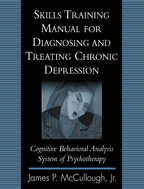Skills Training Manual for Diagnosing and Treating Chronic Depression
Cognitive Behavioral Analysis System of Psychotherapy
James P. McCullough, Jr.
A Paperback Original
A Paperback Original
orderAugust 28, 2001
ISBN 9781572306912
Price: $44.00 188 Pages
Size: 8½" x 11"
“In his creative blending of cognitive, behavioral, and interpersonal strategies, McCullough speaks directly to the clinician, clearly outlining and illustrating how to intervene effectively when working with chronically depressed patients. Recognizing that the feeling of not being able to get what one wants is at the core of this depression, McCullough provides clinically sound guidelines for helping patients to overcome the cognitive, affective, and behavioral obstacles to having their needs met.”

—Marvin R. Goldfried, PhD, Department of Psychology, State University of New York at Stony Brook
“This is quite simply a superb and unique therapist manual. McCullough presents a series of exercises that literally walk the therapist through CBASP treatment. The reader is given the opportunity to identify and constructively address common problems in carrying out the therapy. In its experiential approach to learning, the manual mirrors many of the innovative features of the treatment itself. This manual is essential for any clinician who wants to learn and apply CBASP. It is an outstanding text for students of psychotherapy at all levels and provides instructors with a timesaving, efficient, and indispensable method of teaching.”

—Bruce Arnow, PhD, Stanford University School of Medicine
“The Cognitive Behavioral Analysis System of Psychotherapy (CBASP) is novel, systematic, and has undergone empirical evaluation. Now McCullough has provided an additional tool to aid in the dissemination of this new evidence-based treatment for chronic depression. A gifted clinician and teacher, McCullough not only has determined what needs to be taught, but also has developed an excellent method for doing so. The Skills Training Manual offers clinicians instant feedback on their mastery of key CBASP concepts. The exercises are challenging, while the feedback is gentle and encouraging. I recommend this manual and the accompanying text to practitioners and trainees in diverse settings.”

—Robin B. Jarrett, PhD, Department of Psychiatry, The University of Texas Southwestern Medical Center at Dallas
—Marvin R. Goldfried, PhD, Department of Psychology, State University of New York at Stony Brook
“This is quite simply a superb and unique therapist manual. McCullough presents a series of exercises that literally walk the therapist through CBASP treatment. The reader is given the opportunity to identify and constructively address common problems in carrying out the therapy. In its experiential approach to learning, the manual mirrors many of the innovative features of the treatment itself. This manual is essential for any clinician who wants to learn and apply CBASP. It is an outstanding text for students of psychotherapy at all levels and provides instructors with a timesaving, efficient, and indispensable method of teaching.”
—Bruce Arnow, PhD, Stanford University School of Medicine
“The Cognitive Behavioral Analysis System of Psychotherapy (CBASP) is novel, systematic, and has undergone empirical evaluation. Now McCullough has provided an additional tool to aid in the dissemination of this new evidence-based treatment for chronic depression. A gifted clinician and teacher, McCullough not only has determined what needs to be taught, but also has developed an excellent method for doing so. The Skills Training Manual offers clinicians instant feedback on their mastery of key CBASP concepts. The exercises are challenging, while the feedback is gentle and encouraging. I recommend this manual and the accompanying text to practitioners and trainees in diverse settings.”
—Robin B. Jarrett, PhD, Department of Psychiatry, The University of Texas Southwestern Medical Center at Dallas



